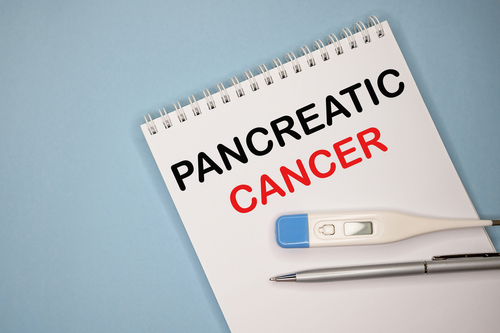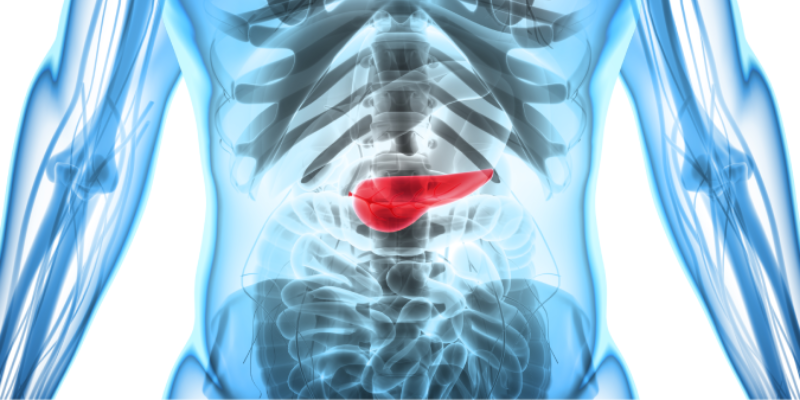
Nimotuzumab plus gemcitabine demonstrated a favorable safety profile and significantly improved survival in patients with locally advanced or metastatic K-Ras wild-type pancreatic cancer, according to results from a randomized trial published in the Journal of Clinical Oncology.
The study reported results from a phase 3 study to verify efficacy and safety of the nimotuzumab-plus-gemcitabine regimen in 82 patients with locally advanced or metastatic tumors. The proportion of patients with K-Ras wild-type tumors was 17.1%. Patients were randomized to either intravenous nimotuzumab (400 mg once per week) or placebo, with 41 patients per group. All patients received a regimen of gemcitabine (1000 mg/m2) on days 1, 8, and 15 for 3 weeks, followed by 1 week of rest, then once per week for 4 weeks. This treatment cycle continued until disease progression, unmanageable toxicity, or withdrawal. Follow-up continued until death or study completion.
Tumor response was evaluated by computed tomography or magnetic resonance imaging every 8 weeks. The primary end point was overall survival (OS). The secondary end points were progression-free survival (PFS), time to progression (TTP), objective response rate (ORR), and clinical benefit response.
Overall Survival Outcomes
Overall, 76 deaths occurred, including 36 in the experimental group and 40 in the placebo group. Mean follow-up time was 57.6 months and 16.6 months, respectively. Median OS was 10.9 months in the nimotuzumab group (95% CI, 5.6-16.3), compared with 8.5 months in the placebo group (95% CI, 5.7-10.0). The hazard ratio (HR) for OS in the nimotuzumab-gemcitabine group was 0.66 (95% CI, 0.42-1.05; log-rank P=.08). When utilizing a restricted mean survival time (RMST) model, OS was significantly longer in the nimotuzumab-gemcitabine group versus the placebo group at the 75-month follow-up mark (18.05 months vs 11.14 months; RMST ratio, 0.62; P=.036)
“The 1-year and 3-year OS rates were 43.6% versus 26.8% and 13.9% versus 2.7% in the investigational and control arms, respectively,” the authors wrote. “These results demonstrated that nimotuzumab increased the median survival time of patients with advanced [pancreatic cancer] with K-Ras wild-type tumors.”
Secondary Outcomes and Safety
PFS was significantly longer in the nimotuzumab treatment group. The median PFS was 4.2 months in the experimental group, compared with 3.6 months in the placebo group (HR, 0.60; 95% CI, 0.37-0.99; log-rank P=.04). At a follow-up of 31 months, the restricted mean PFS was 8.08 in the nimotuzumab group and 4.76 months in the placebo group (RMST ratio, 0.58; P=.036). Median TTP was similar between groups (4.7 months vs 3.7 months, respectively). ORRs and disease control rates (DCRs) were not significantly different between treatment groups. The ORRs were 7.3% and 9.8% in the investigation and control groups, respectively, and DCRs were 68.3% and 63.4%, respectively.
The median treatment duration was 16 weeks in the investigational group and 13 weeks in the placebo group. Median exposure dose of nimotuzumab was 6400 mg. The incidence of adverse drug reactions was similar between groups. One case of a series adverse reaction occurred in the nimotuzumab group, where a patient was hospitalized for a grade 3 bilirubin increase and anemia. No grades 4 or 5 adverse events occurred.
Compared with other studies, the authors concluded that their findings “showed that nimotuzumab might confer a remarkable survival benefit.”







 © 2025 Mashup Media, LLC, a Formedics Property. All Rights Reserved.
© 2025 Mashup Media, LLC, a Formedics Property. All Rights Reserved.